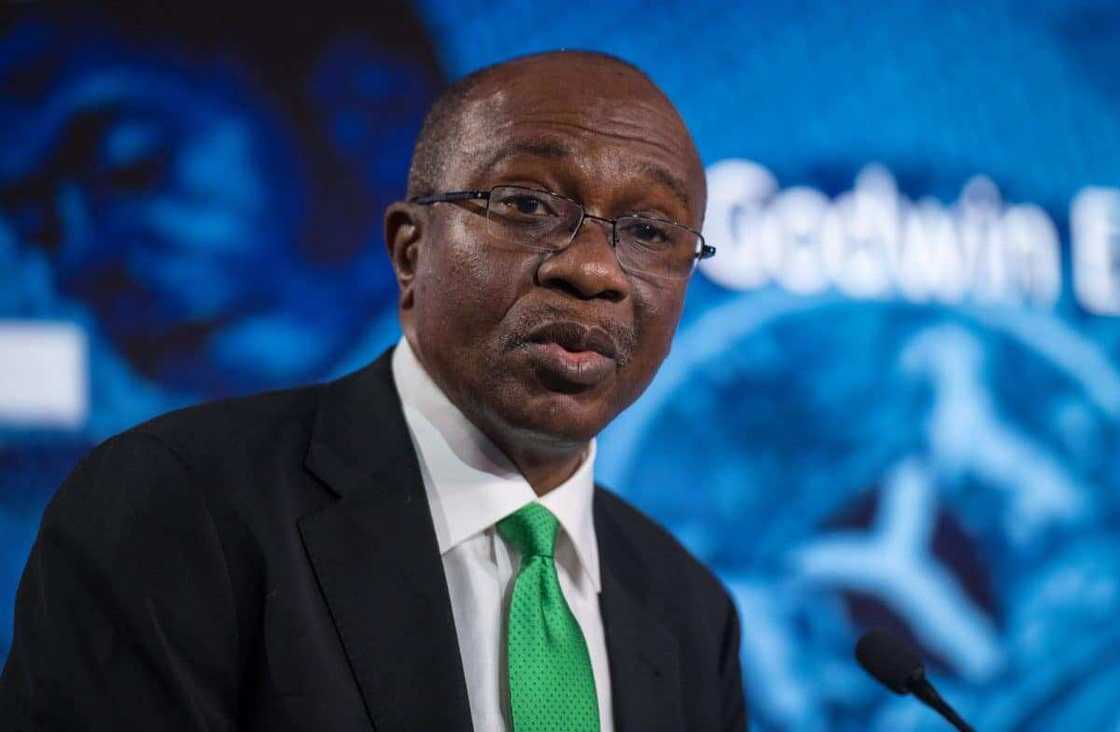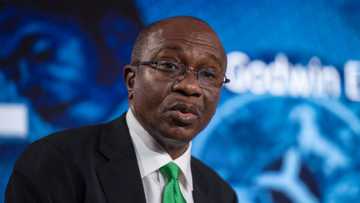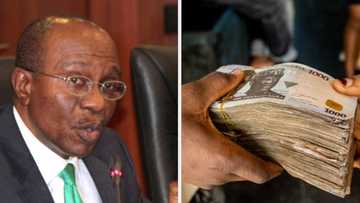CBN Increases Interest Rate to 17.5%, Insists No Extension of Deadline for Deposit of Old Naira Notes
- The CBN for the fifth consecutive time has hiked the MPR interest rate, this time to 17.5%
- The hike comes despite the moderation of December 2022's 21.34% inflation rate
- The CBN also announced that it was not planning to extend the deadline for the depositing of old banknotes
The Central Bank of Nigeria via its Monetary Policy Committee has approved the raise of its benchmark interest rate to 17.5% from 16.5%.

Source: UGC
Mr Godwin Emefiele, the CBN governor disclosed this today, Tuesday, January 24, 2023, while briefing the press at the end of the committee's meeting which was held in Abuja, the nation's capital.
This is the first interest rate increase for the year and the fifth consecutive increase despite protests by key stakeholders. The CBN had effected the interest rate increases in an effort to curb the country's rising inflation rate.
The MPC had earlier raised the rate to 16.5% in November 2022, in an effort to control inflation and ease pressure on the naira. Tuesday's interest rate hike comes up regardless of the easing of last month's (December 2022) headline inflation from 21.47% to 21.34% recorded in November 2022.
PAY ATTENTION: Сheck out news that is picked exactly for YOU ➡️ find the “Recommended for you” block on the home page and enjoy!
The CBN governor acknowledged the recent moderation of the inflation rate but admitted that the country's economy was going through some challenges which would not allow the bank to ease the benchmark interest rate for now, hence the MPC's vote to raise.
Other major decisions taken by the CBN include retaining the MPR asymmetric corridor of +100/-700 basis points.
The Liquidity Ratio which is the proportion of deposits and other assets the banks must maintain to be able to meet short-term obligations was retained at 30%.
The Cash Reserve Ratio (CRR) which is the share of a bank’s total customer deposit that must be kept with the CBN in the form of liquid cash was retained at 32.5%.
What experts are saying about CBN's MPR interest rate hike
Monetary policy regulators use interest rates as a tool to manage liquidity in the economy and tackle rising inflation rates. Apart from reining in inflation, the upward or downward movement of interest rates causes credit facilities offered by banks to become more or less affordable for individuals and businesses.
Tony Iweze, Account Manager at VFD Bank told Legit.ng that the rise in interest rate by the CBN is a commendable move. He said the move will tighten funds circulation and contain a higher inflation rate. He said:
Nigeria's economic challenges seem to many to name, but I believe tightening the interest rate is a step in the right direction. A high interest rate will reduce access to credit and mop up excess liquidity, especially now that the CBN is trying to ensure the circulation of the newly designed naira notes.
Cindy Nwamaka, a stock trader with Tandem Consult, however, disagrees with Iweze. She insists that an upward interest rate could make stocks unattractive to investors. She said:
When interest rate becomes high, stocks become unattractive to investors who are then forced to move their funds to dollar-denominated assets. This is so because the returns investors get for investing in stocks is consumed by inflation. This situation does not also attract foreign investors who fear that whatever returns they could make will be eroded by inflation rate and foreign exchange crisis.
CBN insists no going back on deadline for depositing old naira notes
The CBN governor used the opportunity to reiterate that there would not be an extension on the January 31 deadline for the depositing of old naira notes, despite the bottlenecks associated with the withdrawal of the new naira notes.
Emefiele stressed that the reason for no extension on the January 31 deadline is his belief that 100 days was more than enough for anyone to deposit old banknotes with their banks. He said the CBN went as far as directing banks to open their doors to customers on Saturdays to receive the old naira notes.
In the last couple of weeks, there has been pressure from some quarters, especially the Nigeria Governors’ Forum, the Senate and the House of Representatives for the CBN to extend the deadline for the depositing of old N200, N500 and N1000 notes.
This follows complaints by bank customers that they are unable to receive the new naira notes from ATMs as the CBN had earlier directed the deposit money banks to ensure its availability. A few customers who were able to withdraw the new notes from ATMs have complained about the mutilation of some of the banknotes.
ATMs and other ways to swap your banknotes before Jan 31 deadline
Despite the CBN insisting that it has a surplus of new naira notes, Nigerian banks and customers have continued to lament a shortage of it.
As a result, most banks are still dispensing old naira notes to customers via ATMs even if it's just a few days before the January 31 deadline.
To fast-track the return of old naira notes and circulation of new naira notes, a few other measures have been introduced by the CBN and deposit money banks. These measures include the depositing of banknotes through ATMs, cash deposit fastrack and cash swaps in rural areas.
Source: Legit.ng





